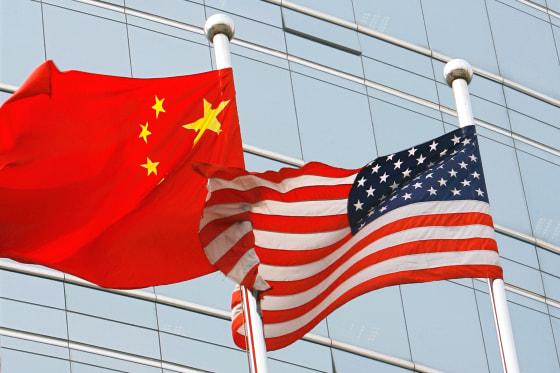The United States government has announced that one of its employees has been barred from leaving China, intensifying diplomatic tensions between the two nations. The individual, whose details have not been disclosed, reportedly encountered restrictions imposed by Chinese authorities, according to a statement from Washington. This incident marks a significant escalation in the increasingly fraught relationship between the US and China, raising concerns over the treatment of American personnel abroad and the broader implications for bilateral cooperation.
US Government Condemns Detainment of Employee in China Amid Rising Diplomatic Tensions
In a move that has escalated existing diplomatic strains, the US government has spoken out strongly against the reported detainment of a US government employee in China. According to Washington, the individual has been prevented from leaving the country despite repeated requests, raising urgent concerns about the legal and humanitarian conditions surrounding the case. The US State Department emphasized the need for transparency, immediate resolution, and adherence to international norms governing diplomatic personnel.
Key Issues Highlighted:
- Restrictions on freedom of movement imposed on the employee.
- Alleged lack of formal charges or due process.
- Potential impact on ongoing diplomatic engagements between the two nations.
| Date Reported | Employee Status | US Response |
|---|---|---|
| April 24, 2024 | Detained, barred from exit | Official protest lodged |
| April 26, 2024 | Awaiting consular access | Calls for transparency intensified |
Analysis of Legal and Diplomatic Efforts to Secure Release of US Government Employee
In response to the detention of a US government employee barred from leaving China, Washington has escalated a range of legal and diplomatic measures aimed at securing their prompt release. The US Department of State has engaged in high-level discussions with Chinese counterparts, invoking established bilateral agreements that emphasize consular access and the protection of foreign nationals. Legal representatives have emphasized the importance of adhering to international law, including provisions under the Vienna Convention on Consular Relations, which obligate host countries to allow prompt communication and access to detained foreign nationals.
Key components of the US response include:
- Formal diplomatic protests lodged through the US Embassy in Beijing
- Requesting immediate consular visits and review of detention conditions
- Engagement with international human rights organizations to monitor the situation
- Coordination with Congress to evaluate legal remedies and sanctions
| Effort Type | Objective | Status |
|---|---|---|
| Diplomatic Dialogue | Press for release and fair treatment | Ongoing |
| Legal Advocacy | Ensure compliance with international conventions | Active |
| Congressional Actions | Evaluate sanctions and policy responses | In review |
Impact on US-China Relations and Potential Policy Shifts in Washington
The recent incident involving the US government employee reportedly barred from leaving China has sent ripples through diplomatic corridors in Washington, intensifying tensions that have been steadily mounting over trade, technology, and security concerns. This development is poised to complicate ongoing negotiations, potentially hardening the US administration’s stance toward Beijing. Analysts suggest Washington may revise visa and travel policies for American personnel stationed in China, emphasizing increased scrutiny and protective measures.
Policy experts in Washington are now closely monitoring the situation, with several possible responses under consideration:
- Enhanced consular support: Expanding the capacity of US diplomatic missions to assist Americans detained or restricted abroad.
- Stricter travel advisories: Issuing more robust warnings for US government employees and citizens traveling to China.
- Reciprocal restrictions: Limiting Chinese officials’ mobility within the United States as a countermeasure.
| Potential Policy Shift | Purpose | Expected Impact |
|---|---|---|
| Increased diplomatic engagement | De-escalate tensions | Improved dialogue channels |
| Travel restrictions | Protect US personnel | Reduced presence in China |
| Reciprocal measures | Pressure Beijing | Heightened bilateral tensions |
Recommendations for US Officials Navigating Employee Safety and Diplomatic Engagements in China
US officials working in or traveling to China must adopt a cautious approach that prioritizes employee safety without compromising diplomatic objectives. It is essential for government agencies to develop comprehensive risk mitigation plans which include regular communication protocols, contingency evacuation strategies, and legal support mechanisms. Reinforcing awareness about local regulations and cultural sensitivities can significantly reduce the likelihood of misunderstandings that could lead to restrictive situations for American personnel.
In addition, fostering transparent and continuous dialogue between diplomatic staff and Beijing authorities is vital to safeguarding diplomatic engagements. Agencies should encourage employees to:
- Report incidents or concerns immediately through official channels
- Participate in cultural and legal briefings before deployment
- Maintain heightened awareness of travel restrictions and surveillance risks
- Leverage inter-agency cooperation for shared intelligence and resources
Enhancing training on these aspects equips officials to navigate complex geopolitical environments effectively while preserving personal liberties and mission success.
| Key Focus | Recommended Action |
|---|---|
| Pre-deployment Preparation | Conduct briefings on local laws and cultural norms |
| Real-time Communication | Establish secure, frequent check-ins |
| Legal Assistance | Ensure immediate access to consular support |
| Crisis Response | Activate emergency evacuation protocols promptly |
Key Takeaways
The incident underscores the ongoing tensions between the United States and China, highlighting the complexities faced by government personnel operating amid strained bilateral relations. As Washington calls for the immediate release of the employee, the situation remains a focal point in broader diplomatic efforts to address issues of legal jurisdiction and human rights. Further developments will be closely monitored as both nations navigate the implications of this high-profile case.







